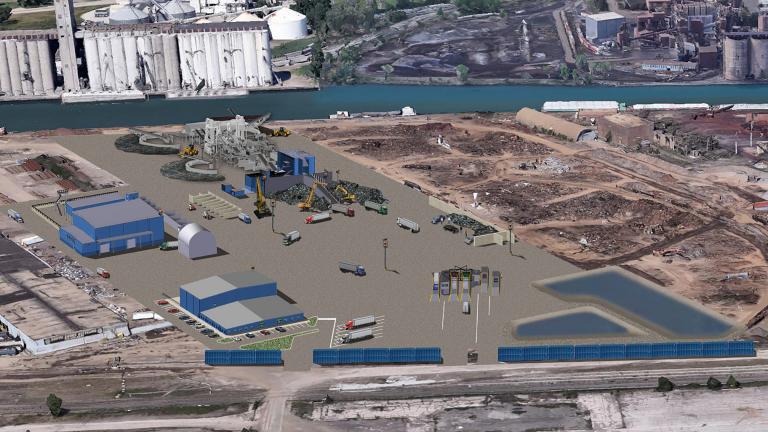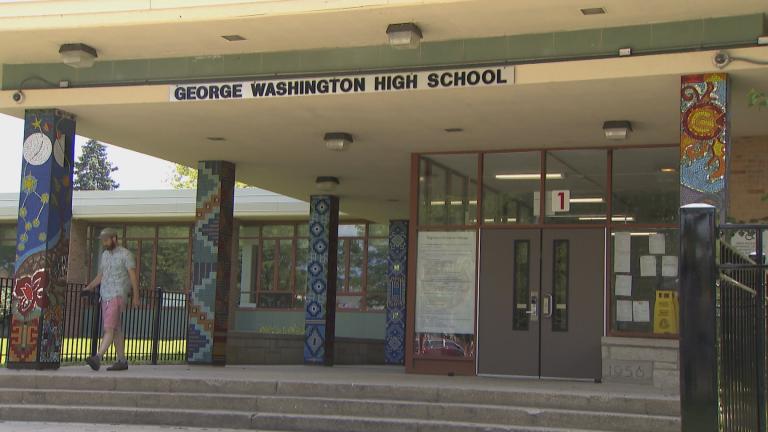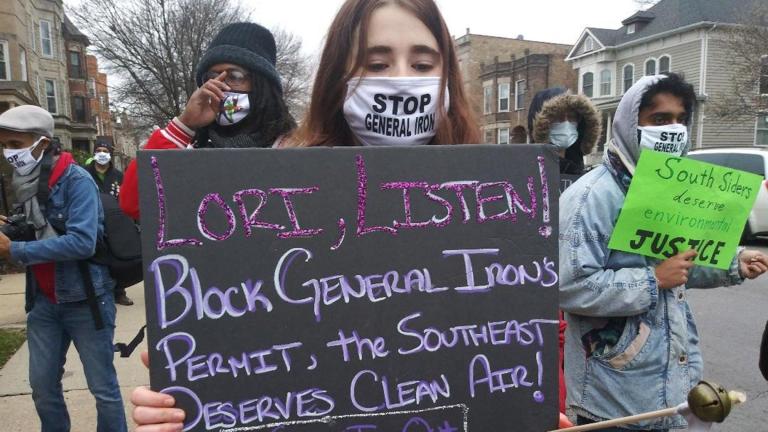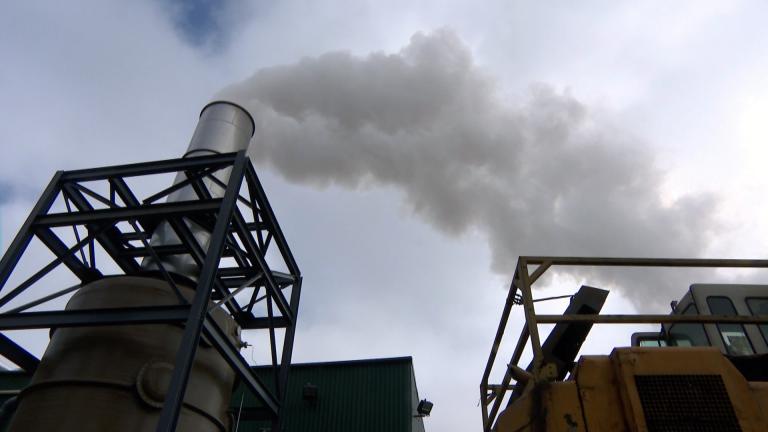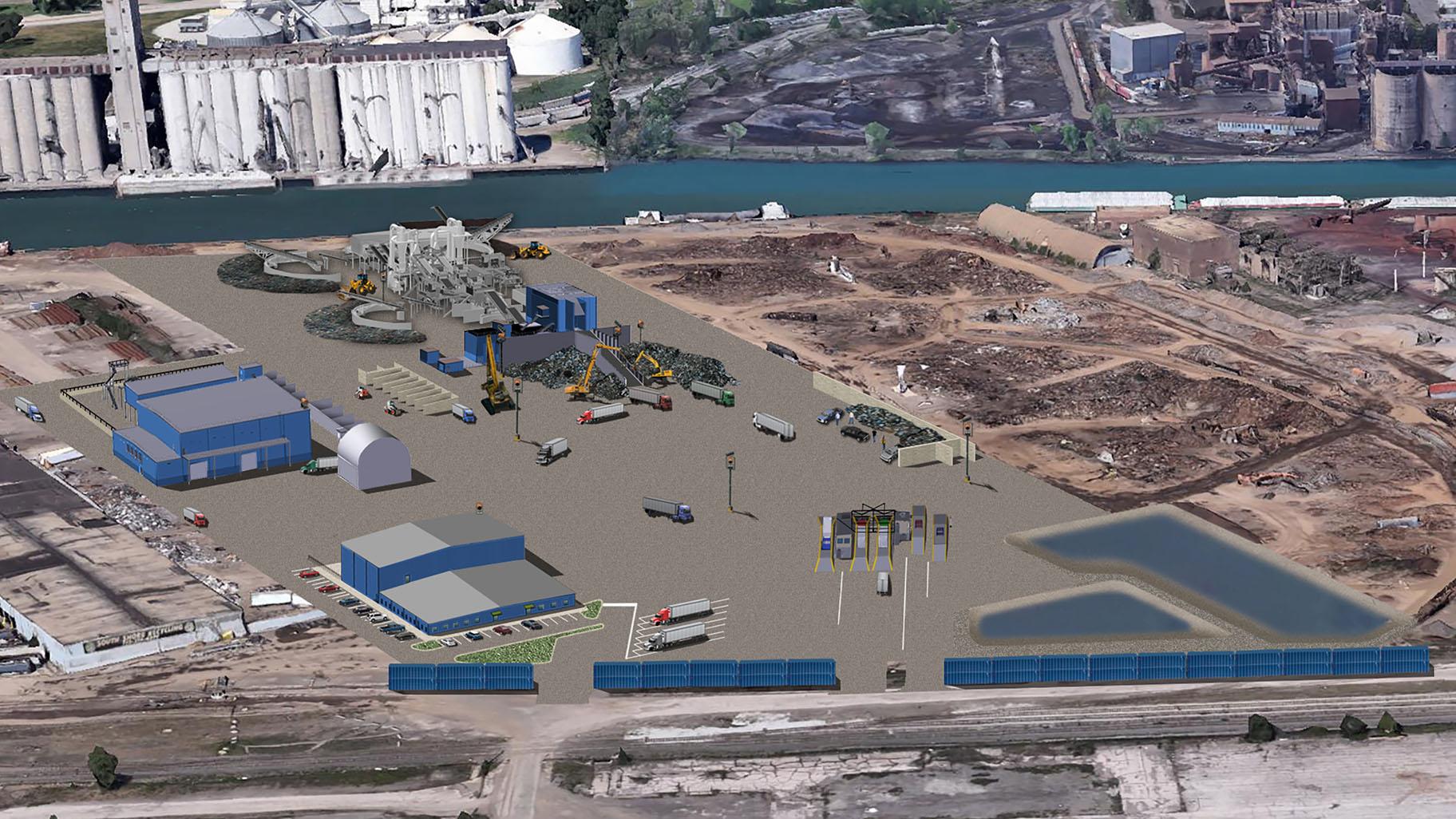 An aerial shot of the newly constructed Southside Recycling, 11600 S. Burley Ave. (Courtesy of Reserve Management Group)
An aerial shot of the newly constructed Southside Recycling, 11600 S. Burley Ave. (Courtesy of Reserve Management Group)
City health officials rejected the final permit sought by the parent company of General Iron to operate a metal shredding and recycling operation on Chicago’s Southeast Side because the operation poses an “unacceptable risk” to the health of residents, officials announced Friday.
Officials with the Chicago Department of Public Health rejected the permit because of the “potential adverse changes in air quality and quality of life that would be caused by operations, and health vulnerabilities in the surrounding communities” as well as the track record of Reserve Management Group, known as RMG, in running similar facilities.
That combination “presents an unacceptable risk,” department officials said.
RMG will now be blocked from operating Southside Recycling at 11600 S. Burley Ave., officials said.
“We are committed to protecting and enhancing the health, environment, and quality of life for all Chicagoans,” said Dr. Allison Arwady, the commissioner of the Chicago Department of Public Health. “In an already vulnerable community, the findings from the [Health Impact Assessment] combined with the inherent risks of recycling operations and concerns about the company’s past and potential noncompliance are too significant to ignore.”
Southside Recycling would be the most "environmentally conscious metal recycling facility in the country," said RMG spokesperson Randall Samborn. The firm will continue to press its lawsuit against the city in attempt to get the permit it needs to operate.
“Politicians and government officials have ignored the facts and instead were cowed by persistent false narratives and misinformation aimed at demonizing our business,” Samborn said in a statement. “What should have been an apolitical permitting process was hijacked by a small but vocal opposition that long ago made clear they would unconditionally oppose this facility, facts and science be damned. Politics, not environmental or public health protection, is the only reason that the city denied Southside Recycling’s permit to operate.”
The final permit Southside Recycling needed had been on hold since May, when Mayor Lori Lightfoot delayed any action after Environmental Protection Administrator Michael Regan said the proposal raised “significant civil rights concerns” and merited an in-depth study.
Regan hailed the city’s decision to deny the permit on Friday.
“This is what environmental justice looks like: All levels of government working together to protect vulnerable communities from pollution in their backyards,” Regan said in a statement.
The in-depth study of the proposal’s impact on the health of people living in surrounding neighborhoods found the operation would not adversely impact the health of residents on the Southeast Side, officials said Wednesday.
However, the study released Friday found that “community conditions on the Southeast Side have been affected by the presence of past and current industry and that the proposed Southside Recycling facility would contribute additional negative impacts to the environment, health, and quality of life for area residents,” according to the department’s statement.
A coalition of groups that organized a month-long hunger strike declared the permit denial should put city officials on notice that Chicago residents would no longer allow the Southeast Side to be “a sacrifice zone.”
“This decision can be a turning point for communities of color that have been hurt by environmental racism for decades,” the groups said in a statement. “Although we are celebrating this decision, the community continues to deal with the toxic legacy that has allowed pollution to accumulate in our community and we will not stop fighting for our right to clean air, and we will continue to fight until the health of Chicago communities like ours can live in a health environment.”
Officials also rejected the permit because of RMG’s track record in Chicago, officials said.
“Officials discovered apparent instances of RMG’s non-compliance with city health and environmental regulations and existing requirements,” according to the department’s statement.
The company failed to obtain necessary permits for foundry sand operations and exceeded permitted capacity for other approved operations, officials said.
Officials also determined that RMG officials had demonstrated a “lack of transparency and responsiveness, such as not reporting an April 2021 building collapse on the site and related failure to properly maintain asbestos-containing materials.”
In August, RMG agreed to pay a $500,000 fine to the federal government as part of an agreement to resolve charges that the firm’s defunct Lincoln Park operation violated the Clean Air Act.
In May 2020, two explosions at the Lincoln Park facility rattled the North Side, and prompted Chicago Department of Health officials to fine General Iron $6,000 for violating state pollution standards. In November 2020, General Iron officials agreed to pay a total of $18,000 in fines after being hit with a dozen citations from city inspectors in connection with the explosions as well as dozens of complaints and citations.
In addition, city officials cited RMG in July for failing to notify the proper authorities that a vacant building collapsed on the site of the proposed facility.
Residents of the Southeast Side and environmental advocates repeatedly urged the city to block the shredding operation from operating in the 10th Ward, a part of the city they said already experiences a disproportionate burden from industrial operations that cause air and soil pollution, traffic congestion and noise.
Regan’s letter echoed those concerns, saying the area’s already poor quality of life would be reduced by the new metal shredder. The company shut down its Lincoln Park operation — which drew numerous violations and triggered tens of thousands of dollars in fines — at the end of 2020.
The health risk assessment found that the proposed Southside Recycling facility would have a positive impact on the economy of Chicago’s Southeast Side by creating a total of 100 jobs, according to the study. That will require the firm to hire 35 new people, and firm officials have agreed to give nearby residents’ preference for hiring, officials said.
The facility would have been to process 500 tons of material per hour of obsolete metal, which would have benefited the entire city, according to the study.
But the facility would have had negative impacts on the area’s traffic congestion by adding 70 truck and car trips during the morning rush hour and an additional 30 during the evening rush hour, according to the study.
The facility would also have a negative impact on noise pollution in the area around the facility, and potentially had a negative impact on the area’s water, soil and air, according to the study.
In addition, there was a potential of explosions or fire at the facility, according to the study.
More than 250 operations on the Southeast Side have been investigated by the EPA for polluting the air with fine particulate matter that has been linked to a higher risk of cancer as well as respiratory disease. Other environmental issues in the neighborhood include heavy truck traffic and hazardous waste sites that are polluted with lead paint and wastewater, according to Regan’s letter.
Contact Heather Cherone: @HeatherCherone | (773) 569-1863 | [email protected]

